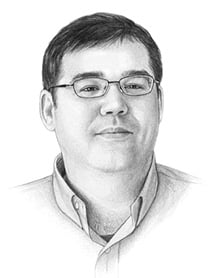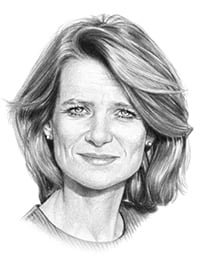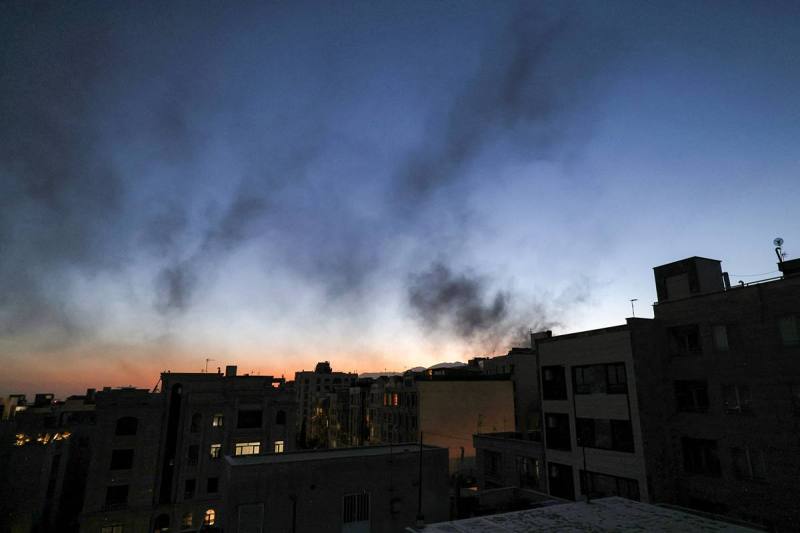Did China Get Billionaires Right?

Illustration for Foreign Policy/Getty Images and iStock photos
As Donald Trump took the presidential oath for a second time, he was surrounded by some of the world’s richest men. But even a famously materialistic president couldn’t outdo the Chinese Communist Party (CCP) when it comes to collecting billionaire support. In March 2018, more than 100 billionaires gathered in Beijing to serve in the Chinese government. Pony Ma, the CEO of web giant Tencent and then China’s richest man, sat alongside Evergrande chairman Hui Ka Yan and 40-plus other members of the ultra-rich in the National People’s Congress (NPC), China’s parliament.
Ma’s wealth, at $47 billion, put him just ahead of Hui, worth $41 billion, as China’s richest man. Another 59 billionaires joined the Chinese People’s Political Consultative Conference (CPPCC), the party’s highest advisory body. The net worth of the NPC and CPPCC combined was estimated at more than $620 billion.
As Donald Trump took the presidential oath for a second time, he was surrounded by some of the world’s richest men. But even a famously materialistic president couldn’t outdo the Chinese Communist Party (CCP) when it comes to collecting billionaire support. In March 2018, more than 100 billionaires gathered in Beijing to serve in the Chinese government. Pony Ma, the CEO of web giant Tencent and then China’s richest man, sat alongside Evergrande chairman Hui Ka Yan and 40-plus other members of the ultra-rich in the National People’s Congress (NPC), China’s parliament.
Ma’s wealth, at $47 billion, put him just ahead of Hui, worth $41 billion, as China’s richest man. Another 59 billionaires joined the Chinese People’s Political Consultative Conference (CPPCC), the party’s highest advisory body. The net worth of the NPC and CPPCC combined was estimated at more than $620 billion.
But as the “two sessions”—the annual meetings of the NPC and CPPCC—met in Beijing, their actual work was to rubber-stamp Xi Jinping’s abolition of presidential term limits, allowing him to hold power indefinitely. Neither body has any actual power. Giving billionaires a place in the legislature was not a reward or a sign of their strength; it was a way to bind them to the party and for them to publicly show their allegiance.
In much of the world, the defining characteristic of billionaires is impunity: the ability to ignore laws, social norms, or borders through the sheer force of wealth. U.S. billionaires do all they can to evade their responsibilities to the state—or to actively subvert the government for their own ends. Capital, and the laws protecting capital, shields and fortifies them. It’s usually only when their wealth itself turns out to be fraudulent, as with FTX founder Sam Bankman-Fried, that they face jail time.
In China, however, every billionaire’s fortune is built upon a thin foundation: the goodwill of the CCP. At every turn, the ultra-rich, especially since Xi took power, are reminded that their wealth exists at the sufferance of the party—and that it could all be taken away. Careful not to draw attention to themselves or seem to challenge the party’s right to “lead everything,” billionaires’ position in China is inherently precarious.
Members of the National People’s Congress applaud as Chinese President Xi Jinping arrives at the Great Hall of the People in Beijing on March 11, 2018.Kevin Frayer/Getty Images
Even after the abandonment of Maoism, the CCP has never been entirely comfortable with the wealthy. In the 1980s, Chinese leader Deng Xiaoping stated that it was fine for “a few” households and regions to “get rich first,” but he said it about peasants, not billionaires, and added that the rich had an obligation to lift up the poor. The party’s reluctant embrace of private business came with many caveats.
Culturally, though, China embraced wealth from the 1980s on with the eagerness of a starving man falling on a banquet. The phrase “to get rich is glorious,” often falsely attributed to Deng, was popularized in Western coverage by Sinologist Orville Schell. Still, it accurately captured a mood that lasted for decades. After two generations of deprivation and revolutionary austerity, the coming of money, and all the possibilities of money, seemed miraculous.
The party adapted. It wasn’t until the late 1990s that the first mainland Chinese billionaires emerged—and they had a golden sheen about them, even for the government. A newly powerful country was flexing its financial muscles, and billionaires matched that image. The wealthy were celebrated in magazines, self-help books, and TV specials, especially since the roughly leveled playing field meant that they had made their own fortunes, going from restaurant owners to real estate magnates—or in one case from laundress to international trader. “Entrepreneurs” was a favorite term for the successful, without the tinge of negativity given to other terms for wealth from the Maoist era.
In 2002, the CCP reversed its previous policy of shutting out entrepreneurs, who were previously seen as politically suspect. This didn’t lead to businesspeople flocking to the party but instead saw party members flowing into business, where their existing connections proved a serious advantage. Even as private initiative was celebrated, it depended on government backing.
That dynamic was most visible in the real estate sector, which more than tripled its share of national GDP in the 2000s. Local governments needed to sell land in order to meet their financial obligations, and the well-connected could buy it cheap—or shut competitors out altogether, legally or otherwise. (A friend’s uncle bid against connected businessmen in Shandong in 2006; he was kidnapped, had his legs severed, and was left to bleed to death on top of one of his own construction sites.) The loans they needed to buy government land often came in turn from government-run banks, in a cycle of mutual profit. Officials welcomed GDP growth for their careers and bribes for themselves.
Other entrepreneurs found smarter methods of leveraging the needs of local government. In his book China in Ten Words, writer Yu Hua tells the story of one businessman who would “bamboozle himself a reputation as a nationally known entrepreneur.” The businessman went to Beijing to bid on the advertising slots before the much-watched 7 p.m. news broadcast, and after spending an astronomical sum of 80 million yuan, he was hailed as the “Bidding King” by media, winning him and his firm even more free publicity. He then returned to his hometown and called a meeting with local government officials. “My own assets are just a tiny fraction of [80 million],” he told them. “If you back me up, then our city will have produced an entrepreneur famous throughout the nation. If you let me down, then our city will have produced the biggest trickster in the whole country.” Faced with this choice, the city’s leaders ordered the local commercial bank to lend him 200 million yuan.
Yu leaves the businessman unnamed and the story unverified. One candidate for the tale is Jack Ma, the creator of e-commerce giant Alibaba, who shares his hometown of Hangzhou with Yu. Ma emerged as one of the most charming, and nationally celebrated, businessmen of the 2000s, known for his impish grin and patriotic enthusiasm for defeating foreign interlopers such as eBay. By the end of 2018, he was China’s richest man, worth some $39 billion. (China’s billionaires have never cracked the $70 billion mark, which leaves them consistently outside the world’s top 20 richest people.)
Ma was just one of a pantheon of billionaires celebrated as role models by parents and the party alike. In May 2013, two months after Xi took office as president, the second-highest-grossing movie in China was a tale of three future billionaires. American Dreams in China was a thinly veiled retelling of the rise of New Oriental, an English-language education company that became an omnipresent giant in the 2000s, specializing in preparing students to study abroad. Its three heroes, presented as plucky go-getters, were based on New Oriental’s founder, Yu Minhong, whose wealth had just topped the $1 billion mark, and his two venture capital backers.
Yet unlike the legal firewalls and political pull enjoyed by U.S. billionaires, none of this success came with security. The newly wealthy were caught in a bind; their wealth let them buy off local officials, and eventually eclipse them, but as their fame grew, they attracted the attention of higher-ranking officials who demanded their own share of the pie.
Their time was inevitably spent—as anthropologist John Osburg detailed in his 2013 book, Anxious Wealth—maintaining intricate networks of influence, profit, and corruption. It was impossible to rise cleanly: Even if your original business was honest, protecting it required not just bribery but participation in networks of mutual vice. Self-compromise made you trustworthy to others.
And while the CCP was willing to tolerate, and even praise, the fresh crop of billionaires, the authorities also regularly harvested them. Which billionaires fell was a matter of arrogance and chance: The most obviously criminal tended to be culled, such as the murderous Liu Han, executed in 2015, or early fugitive Lai Changxing, but sometimes it was simply having picked the wrong political patron. Each fall acted as a reminder to others to stay in line and also let officials divvy up the assets of the fallen.
The Hurun Rich List, a ranking of the ultra-wealthy put together by British analyst Rupert Hoogewerf since 1999, became known as the “fattened pig list,” with the joke being that so many of its most prominent members were then picked for slaughter by the party. Three researchers in 2012 found that being on the list increased your likelihood of being charged, investigated, or arrested from 7 percent to 17 percent. Others found that just appearing on the list increased the cost of auditors, who perceived it as creating heightened risk. (Hoogewerf disputes this, saying that only 1 percent of those on the list have fallen.)
Political risk has sharply increased under Xi. To the public, he promised a crackdown on the corruption and excess of the 2000s. To his fellow party leaders and elders, he promised a reassertion of the centrality of party power. At first, this manifested mostly as demands for public obeisance to the party. Groveling apologies and vows to follow the party, such as that given in 2018 by ByteDance founder Zhang Yiming over “vulgar” content on one of its apps, became common. But the creation of wealth went on regardless. By 2021, the number of billionaires had peaked at 1,185.
The COVID-19 pandemic, and the three years of lockdowns and controls that followed, made business in China even more dependent on government goodwill. Xi took the pandemic as an opportunity to crush entire business sectors he saw as having grown uncomfortably large or socially threatening. A 32-month crackdown on tech, tightening data regulations and censorship demands and blocking initial public offerings and foreign deals, wiped trillions of dollars off stock market prices. Ma disappeared into years of mandated exile from public appearances after he voiced mild criticism of regulators. Much of the private education sector was made illegal, crashing the value of New Oriental’s stock from $195 to barely over $20 in the course of five months. The number of billionaires fell 36 percent in three years.
Yet the biggest casualty of the pandemic was the one sector the government never intended to touch: real estate. A yearslong collapse has smashed the real estate tycoons who were once mainstays of the Hurun list. Evergrande’s Hui saw his wealth fall under $1 billion in 2023, followed by his detention. The loss of a sector that had come to represent more than a quarter of GDP contributed to an economic crisis that has unnerved the CCP.
That produced the February meeting between Xi and CEOs where he reassured them that the party was ready to offer the private sector new support—but also reinforced his own centrality, with CEOs arranged around him to pay due homage. The billionaires were there to show Xi’s strategic priorities, not their own, with manufacturing and agriculture at the center; Jack Ma was back but pushed to the end of the table.
In an era of unchecked billionaire power in the West, it might be tempting to think China has found a better way. But the tools of party power used against the ultra-wealthy are employed more frequently and more cruelly against the poor and powerless, whether Uyghur families, street vendors, small businesses, or feminist activists.
And one class of the ultra-wealthy remains genuinely untouchable: the family members of party leaders. Xi’s family assets are enormous and also unreportable by any Chinese media. When Bloomberg began reporting on it in 2012, Bloomberg as a firm was threatened with total expulsion from China and acquiesced to official demands to self-censor.
Former Chinese Premier Wen Jiabao’s wife, Zhang Peili, took over the country’s diamond trade while her husband was in office from 2003 to 2013 and accumulated at least $2.7 billion in assets through various business dealings. Those around them might be targeted, such as Zhang’s advisor Desmond Shum, who fled China under Xi, or real estate magnate Xiao Jianhua, who acted as a consigliere for many of Xi’s relatives and was sentenced to 13 years in prison in 2022. But the wealth of the party, like the power of the party, remains unquestioned.
This post is part of FP’s ongoing coverage of the Trump administration. Follow along here.
James Palmer is a deputy editor at Foreign Policy. X: @BeijingPalmer
More from Foreign Policy
-

Zelensky stands before four Ukrainian flags; cameras are pointed at him. It’s Time for Ukraine to Accept an Ugly Peace
Seven things for Zelensky to keep in mind as cease-fire negotiations start.
-

Then-presidential candidate Donald Trump speaks before a capacity crowd at a rally for his campaign on April 10, 2016 in Rochester, New York. Trump Is Not a Revolutionary
Not all political upheaval is created equal.
-

German soldiers unload the U.S.-made MIM-104 Patriot surface-to-air missile system in Jasionka, Poland. The Latest Russian Missile Is Bad News for NATO
Oreshnik is a different beast from its predecessors.
-

French Emperor Napoleon Bonaparte leads the final assault by the Imperial Guard before his defeat at the Battle of Waterloo in what is today Belgium, on June 18, 1815. The Cost of Ignoring Geopolitics
Like Napoleon and the Ming dynasty, Europe is paying the price for strategic blindness.








Join the Conversation
Commenting on this and other recent articles is just one benefit of a Foreign Policy subscription.
Already a subscriber?
.
Subscribe
Subscribe
View Comments
Join the Conversation
Join the conversation on this and other recent Foreign Policy articles when you subscribe now.
Subscribe
Subscribe
Not your account?
View Comments
Join the Conversation
Please follow our comment guidelines, stay on topic, and be civil, courteous, and respectful of others’ beliefs.
Change your username |
Log out
Change your username:
CANCEL
Confirm your username to get started.
The default username below has been generated using the first name and last initial on your FP subscriber account. Usernames may be updated at any time and must not contain inappropriate or offensive language.